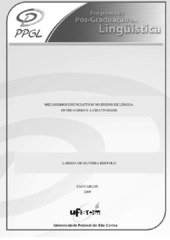Mostrar el registro sencillo del ítem
Mecanismos enunciativos no ensino de língua : entre o erro e a criatividade
| dc.contributor.author | Bertolo, Larissa de Oliveira | |
| dc.date.accessioned | 2016-06-02T20:25:03Z | |
| dc.date.available | 2009-12-02 | |
| dc.date.available | 2016-06-02T20:25:03Z | |
| dc.date.issued | 2009-09-30 | |
| dc.identifier.citation | BERTOLO, Larissa de Oliveira. Mecanismos enunciativos no ensino de língua : entre o erro e a criatividade. 2009. 188 f. Dissertação (Mestrado em Ciências Humanas) - Universidade Federal de São Carlos, São Carlos, 2009. | por |
| dc.identifier.uri | https://repositorio.ufscar.br/handle/ufscar/5676 | |
| dc.description.abstract | This work falls within the scope of the enunciative-linguistic research. We want to build a relationship between linguistic analysis and practice of teaching and learning of mother language, speeded us on the theoretical and methodological perspectives of the Theory of Enunciative Operations developed by Antoine Culioli. The research question refers to the shifts of the enunciative marks of person-space-time in the textual production of the student in process of teaching and learning. Such enunciative shifts, as we have noted, can cause the student s textual compromise. Considering that the context in question is the teaching and learning language, we believe that such occurrences involve the cognitive-linguistic development of the student, a fact which interests us as a background for the linguistic issues focused here. The corpus of analysis is composed of assignments and fables texts. In the latter, the enunciative shifts do not compromise the production of meanings of the text, contrary to what occurs, in general, in school texts. To achieve the specific goals, we seek to understand the movement between the marks of person-space-time in the utterances of school texts and of fables, concentrating our analysis on the lexical-grammatical relations which involve the enunciative shifts. These analysis have led us, as a result, to recognize the shifts of the enunciative categories responsible for compromising the student's text, as well as to identify them as linguistic-statements resources used in the production of meaning in fables texts. In response to overall objectives, we believe that the approach of these issues in the teaching/learning of language can indicate a path so that the pedagogical practices accomplish, geared towards the development of students discursive competence, a task that is objectified by the school. | eng |
| dc.format | application/pdf | por |
| dc.language | por | por |
| dc.publisher | Universidade Federal de São Carlos | por |
| dc.rights | Acesso Aberto | por |
| dc.subject | Linguística | por |
| dc.subject | Enunciação (Linguística) | por |
| dc.subject | Teoria das operações enunciativas | por |
| dc.subject | Língua e linguagem - estudo e ensino | por |
| dc.subject | Linguistics | eng |
| dc.subject | Linguistic enunciation | eng |
| dc.subject | Theory of enunciative operations | eng |
| dc.subject | Language teaching | eng |
| dc.title | Mecanismos enunciativos no ensino de língua : entre o erro e a criatividade | por |
| dc.type | Dissertação | por |
| dc.contributor.advisor1 | Onofre, Marilia Blundi | |
| dc.contributor.advisor1Lattes | http://lattes.cnpq.br/4908382415301882 | por |
| dc.description.resumo | Este trabalho insere-se no âmbito da pesquisa linguístico-enunciativa. Buscamos construir uma relação entre análise linguística e práticas de ensino-aprendizagem de língua materna, pautando-nos nos pressupostos teóricos e metodológicos da Teoria das Operações Enunciativas desenvolvida por Antoine Culioli. A questão de pesquisa refere-se aos deslocamentos das marcas enunciativas de pessoa-espaço-tempo em produção de texto de alunos em processo de ensino-aprendizagem. Tais deslocamentos enunciativos, conforme observamos, podem provocar o comprometimento do texto do aluno. Considerando que o contexto em questão é de ensino-aprendizagem de língua, julgamos que tais ocorrências implicam o desenvolvimento linguístico-cognitivo do aluno, fato que nos interessa como pano de fundo para as questões linguísticas aqui focalizadas. O corpus de análise é composto de redações e de textos fabulares. Nestes últimos, os deslocamentos enunciativos não comprometem a produção de sentidos do texto, ao contrário do que ocorre, em geral, em textos escolares. Para atingir os objetivos específicos, procuramos compreender o movimento de passagem entre as marcas de pessoa-espaço-tempo nos enunciados de textos escolares e de fábulas, concentrando nossas análises nas relações léxico-gramaticais que envolvem os deslocamentos enunciativos. Essas análises levaram-nos, como resultado, a reconhecer os deslocamentos das categorias enunciativas responsáveis por comprometer o texto de aluno, bem como identificá-los como recursos linguístico-enunciativos empregados na produção de sentido nos textos fabulares. Em resposta aos objetivos gerais, entendemos que a abordagem dessas questões no ensino/aprendizagem de língua pode indicar um caminho para que se efetivem as práticas pedagógicas voltadas para o desenvolvimento da competência discursiva dos alunos, tarefa que se objetiva pela escola. | por |
| dc.publisher.country | BR | por |
| dc.publisher.initials | UFSCar | por |
| dc.publisher.program | Programa de Pós-Graduação em Linguística - PPGL | por |
| dc.subject.cnpq | LINGUISTICA, LETRAS E ARTES::LINGUISTICA | por |
| dc.contributor.authorlattes | http://lattes.cnpq.br/6358351541849570 | por |
